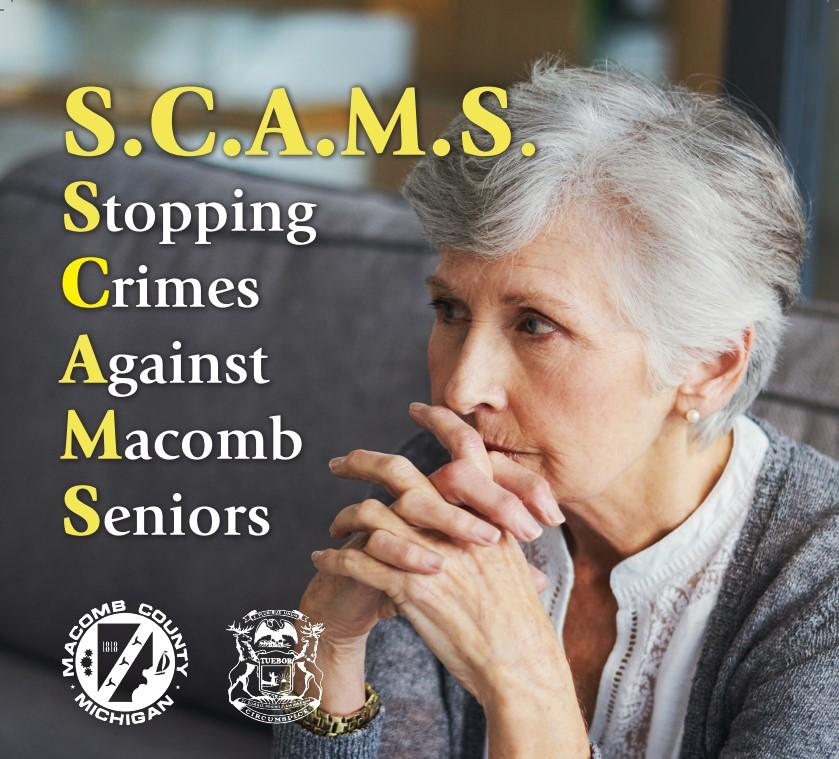How to protect yourself from SCAMS
-

Don’t be pressured to make an immediate decision.
- Don’t pay for something merely because you will get a free gift.
- Get all information in writing before you agree to buy.
- Check out a charity before you give.
- Don’t invest your money with an unknown caller who insists you make up your mind immediately.
- Always be skeptical of salespeople that call you. Typically roofers, repairmen, and professional money investors don’t contact you, you contact them. Check out unsolicited offers with the Better Business Bureau, local consumer protection agency, Prosecutor’s Office, or the state Attorney’s General’s Office.
- Be cautious of statements that you’ve won a prize, particularly if the caller states that you must send money to claim the prize.
Wednesday, April 24, 2024
11:00am
Windemere Park of Warren
31800 Van Dyke Ave.
Warren, MI 48093
Thursday, April 25, 2024
2:00pm
American House Lakeshore
28801 Jefferson Ave.
St. Clair Shores, MI 48081
Sunday, May 19, 2024
1:00pm
Bethel Church of the Nazarene
51850 North Ave.
Macomb, MI 48042
Tuesday, June 18, 2024
10:30am
Macomb Community College, South Campus
K Building, Room 301
14500 E. 12 Mile Road
Warren, MI 48088
Tuesday, June 18, 2024
5:30pm
Macomb Community College, Center Campus
University Center, Assembly Hall
43901 University Dr.
Clinton Twp., MI 48036
Tuesday, September 17, 2024
2:00pm
Eastpoite Memorial Library
15875 Oak Ave.
Eastpointe, MI 48021
Telemarketing fraud involves several different types of scams that con artists use to try to get money. Fraudulent telemarketers try to take advantage of older people on the theory that they may be more trusting and polite toward strangers.
Telemarketing call times are restricted to between 8 a.m. and 9 p.m.
It’s illegal for a telemarketer to call you if you’ve asked not to be called. The National Do Not Call Registry is a free, easy way to reduce the telemarketing calls you get at home. Register by visiting www.donotcall.gov or call toll-free 1-888- 382-1222 from the phone that you want to register. You will remain registered for five years, until the number is disconnected, or until you take it off the registry. After five years, you can renew your registration.
Be aware…Don’t fall for theses common telemarketing scams:
Prize Offers – You usually have to do something to get your “free” prize, like attend a sales meeting, buy something, pay a fee, or give out a credit card number. Prizes are usually worthless and overpriced.
Travel Packages – “Free” or “low cost” vacations can end up costing a lot in hidden costs. Usually you will pay a high price for part of the package like the airfare or hotel. Typically the total cost will end up running two or three times what you were led to believe.
Investments – Each year millions of dollars are lost on get rich quick schemes that promise high returns with little or no risk. Typically these scams involve, cable television production deals, Internet gambling, rare coins, art, or other investment opportunities. These con artists rely on the fact that investing may be complicated, and many people don’t research the investment process.
Charities – Con-artists often push you for an immediate gift, but will not send written information so you can check them out. They also may try to confuse you by using names that sound like well-known charitable organizations or even law enforcement agencies.
Recovery Scams – If you buy into any of the above scams, you’re likely to be called again by someone promising to get your money back. Be careful not to lose more money to this common practice. Even law enforcement officials can’t guarantee they’ll recover your money.
Foreign Lotteries – Scam operators often based in Canada are using the telephone and direct mail to entice U.S. consumers to buy chances in high-stakes foreign lotteries from as far away as Australia and Europe. These lottery solicitations violate U.S. law, which prohibits the cross-border sale or purchase of lottery tickets by phone or mail.
- Call your local police department
- The Prosecuting Attorney’s Office: 866-498-8503
- Federal Trade Commission: 877-FTC-HELP (1-877-382-4357)
These scams involve a person from a foreign country who either contacts you by phone or through the mail and tells you that a recently deceased family member has money tied up in a foreign bank and needs you to act as their representative for a percentage (usually 30%) of the money in the bank. In the end the scam is designed so that you will put up some of your own money in the hopes that you will be getting a big return when the money is released from the foreign bank.
If you hear these or similar lines from a telephone salesperson say “no thank you” and hang up the phone:
- You’ve been specially selected to hear this offer.
- You’ll get a wonderful free bonus if you purchase our product. You’ve won one of five valuable prizes.
- You’ve won big money in a foreign lottery.
- This investment is low risk and provides a higher return than you can get anywhere else.
- You have to make up your mind right now.
- We’ll just put the shipping and handling charges on your credit card.
- You don’t need any written information about our company or references.
It is a criminal felony for a person through fraud, deceit, misrepresentation, or unjust enrichment, obtain, use, or attempt to obtain or use money or property of a person, directly or indirectly benefiting himself or herself, knowing or having reason to know that the person was a vulnerable adult. The Social Welfare Act defines vulnerability as a person 18 years or older who has a condition in which said person is unable to protect himself or herself from abuse, neglect or exploitation because of a mental or physical impairment or because of advanced age.
Michigan Law makes it mandatory for health care, social welfare, mental health, law enforcement, and other human services providers to report their suspicions of vulnerable adult abuse, neglect or exploitation to Adult Protective Services. However, anyone suspecting that a vulnerable adult has been abused, neglected or exploited may report his or her suspicions to the Adult Protective Services Unit of the Department of Human Services by calling 855-444-3911, 24-hours a day, 7-days a week.
Aside from contacting Adult Protective Services, anyone suspecting that a vulnerable adult has been abused, neglected or exploited should also contact their local police department and file a police report immediately. If in doubt, remember that it is better to err on the side of caution. Failure, or delay, in making the call could cost a vulnerable adult more than their life savings; it could cost them their life.
The National Committee for the Prevention of Elder Abuse (NCPEA) is an association of researchers, practitioners, educators, and advocates dedicated to protecting the safety, security, and dignity of America’s most vulnerable citizens. The NCPEA Web site contains numerous resources including a bibliography of elder abuse resources.
The National Center on Elder Abuse (NCEA) houses the Clearinghouse on Abuse and Neglect of the Elderly (CANE). The Web site contains basic fact sheets on elder abuse, information on reporting, NCEA publications, online discussion board, statistics and much more. This is a federal grant-funded partnership of leading organizations involved with preventing elder abuse.
The Administration for Community Living contains fact sheets, studies and area programs.







